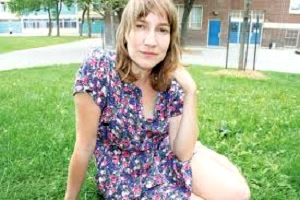De Canadese schrijfster Sheila Heti werd geboren op 25 december 1976 in Toronto als dochter van Hongaarse Joodse immigranten. Heti studeerde kunstgeschiedenis en filosofie aan de Universiteit van Toronto en schrijven voor toneel aan de National Theatre School of Canada. Ze werkt als redacteur Interviews bij The Believer. Haar verhalenbundel “The Middle Stories” werd in 2001 uitgegeven, toen ze vierentwintig was en vertaald in het Duits, Frans, Spaans en Nederlands. Heti’s roman “Ticknor” verscheen in 2005. In 2011 publiceerde zij “The Chairs are Where The People Go”, geschreven samen met haar vriend Misha Glouberman. In september 2010 werd “How Should a Person Be?” gepubliceerd. Het werd gekozen door de New York Times als een van de 100 beste boeken van 2012 en door James Wood van The New Yorker als een van de beste boeken van het jaar. Heti stond aan de wieg van Trampoline Hall, een populaire maandelijkse lezingenreeks in Toronto en New York, waarin mensen over onderwerpen buiten hun vakgebied spreken . Heti was als kind actrice en als tiener verscheen zij in shows geregisseerd door Hillar Liitoja, de oprichter en artistiek directeur van het experiemental DNA Theater. In 2010 speelde zij een rol in Margaux Williamson’s film “Teenager Hamlet”. In november 2013 regisseerde Jordanië Tannahill Heti ’s toneelstuk “All Our Happy Days are Stupid” in Toronto Videofag. Heti ’s tien jaar lange worsteling om het stuk te schrijven is een primaire plot in haar roman “How Should a Person Be?”
Uit: How Should a Person Be?
“That night, after spending several hours staring at my impossible play, I finally decided I would tell the theater to pull it. I had been laboring on it for so many years, never getting any closer to making it a thing of beauty. It resisted my every advance. I got up and left my apartment in frustration and went out to a party to celebrate three more books of poetry in the world.
The party was in a wide and cavernous room with a stage up front and the ceiling painted brown, hung around the sides with brown velvet. A large disco ball rotated in the center, and everything was polished wood, semi-formal and awful.
Standing alone by the bar, I wondered if I could love the boy I noticed at the end of it — the one with the curly brown hair, who looked like a washed-out, more neutral version of the first boy I loved. When he stepped outside onto the front steps, I thought, If he has gone out there to smoke, I will love him. But when I got outside, though I could see a cigarette dangling from his lips, I did not love him.
I went back inside to get myself a drink, and was standing by the bar when a man, slightly taller than me, stepped out from the crowd and moved toward me. My stomach lurched. I turned away. I felt so attracted to him, I couldn’t let myself speak. I knew him: his name was Israel. This was a guy whose girlfriend I had complimented the year before, running into her on the street and saying, Your boyfriend is the sexiest guy in the city. Later, when I learned that she was mad at me for saying this, I got upset. I had genuinely wanted to compliment her!
I had met Israel once before, several years ago, and never forgot it. I was married at the time, and was going down in an elevator in a building of artists’ studios. He entered on the same floor and stood there beside me. He had killer eyes, huge, jaded soul-sucking eyes, a nice, easy, lazy smile, big thick lashes, and the lips of a real pervert.”

Sheila Heti (Toronto, 25 december 1976)
